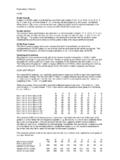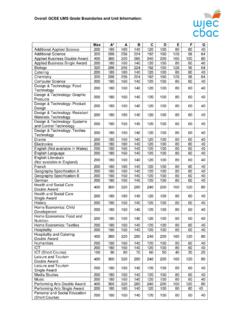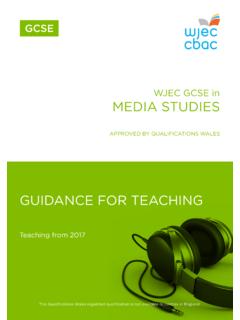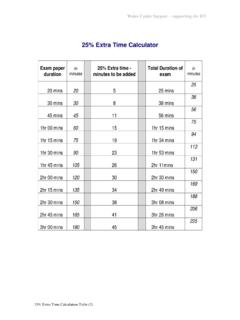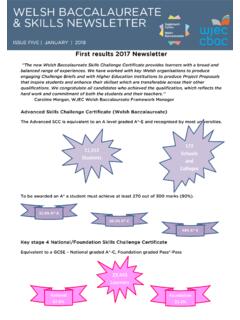Transcription of GCSE Specification Template - WJEC
1 gcse (9-1). WJEC eduqas gcse (9-1) in SOCIOLOGY. ACCREDITED BY OFQUAL. DESIGNATED BY QUALIFICATIONS WALES. Specification . Teaching from 2017. For award from 2019. gcse SOCIOLOGY 1. WJEC eduqas gcse (9-1) in SOCIOLOGY. For teaching from 2017. For award from 2019. Page Summary of assessment 2. 1. Introduction 3. Aims and objectives 3. Prior learning and progression 4. Equality and fair access 4. 2. Subject content 5. Component 1 6. Component 2 11. 3. Assessment 15. Assessment objectives and weightings 15. 4. Technical information 16. Making entries 16. Grading, awarding and reporting 16. WJEC CBAC Ltd. gcse SOCIOLOGY 2. gcse SOCIOLOGY. SUMMARY OF ASSESSMENT. Component 1: Understanding Social Processes Written examination: 1 hour 45 minutes 50% of qualification This component covers the following topic areas: Key concepts and processes of cultural transmission Families Education Sociological research methods A written assessment with a mix of short answer, structured questions and extended- response questions, all compulsory.
2 The extended response questions will require candidates to draw together different areas of knowledge, skills and/or understanding from across the relevant Specification content. Component 2: Understanding Social Structures Written examination: 1 hour 45 minutes 50% of qualification This component covers the following topic areas Social differentiation and stratification Crime and deviance Applied methods of sociological enquiry A written assessment with a mix of short answer, structured questions and extended- response questions, all compulsory. The extended response questions will require candidates to draw together different areas of knowledge, skills and/or understanding from across the relevant Specification content. This linear qualification will be available for assessment in May/June each year. It will be awarded for the first time in summer 2019. Ofqual Qualification Number (listed on The Register): 603/1045/5.
3 Qualifications Wales Designation Number (listed on QiW): C00/1176/4. WJEC CBAC Ltd. gcse SOCIOLOGY 3. gcse SOCIOLOGY. 1 INTRODUCTION. Aims and objectives The WJEC eduqas gcse in Sociology is designed to foster in learners an understanding and critical awareness of the social world around them. The Specification focuses on the importance of social structure in explaining social issues. Learners will be encouraged to explore and debate contemporary social issues to enable them to challenge taken-for-granted assumptions and to question their everyday understanding of social phenomena. By following this course, learners will develop their own sociological awareness through active engagement with the contemporary social world. This Specification will develop learners' ability to think sociologically in relation to their experience of the social world around them so that they are able to play a positive, active and informed role in society.
4 This WJEC eduqas gcse Specification in Sociology requires learners to: apply their sociological knowledge, understanding and skills to develop an understanding of relationships and tension between social structures and individual agency within a UK and global context critically analyse information and use evidence in order to make informed arguments, reach substantiated judgements and draw conclusions use and apply their knowledge and understanding of how social structures and processes influence social control, power and inequality use sociological theories to understand social issues, debates, social changes and continuities over time understand and evaluate sociological methodology and a range of research methods use sociological terminology appropriately and make connections between the key areas of subject content. WJEC CBAC Ltd. gcse SOCIOLOGY 4. Prior learning and progression There are no previous learning requirements for this Specification .
5 Any requirements set for entry to a course based on this Specification are at the school/college's discretion. This Specification provides a suitable foundation for the study of sociology at either AS or A level. In addition, the Specification provides a coherent, satisfying and worthwhile course of study for learners who do not progress to further study in this subject. The knowledge and understanding and skills developed through the study of gcse Sociology will also provide a basis for further learning and career choices. Equality and fair access This Specification may be followed by any learner, irrespective of gender, ethnic, religious or cultural background. It has been designed to avoid, where possible, features that could, without justification, make it more difficult for a learner to achieve because they have a particular protected characteristic. The protected characteristics under the Equality Act 2010 are age, disability, gender reassignment, pregnancy and maternity, race, religion or belief, sex and sexual orientation.
6 The Specification has been discussed with groups who represent the interests of a diverse range of learners, and the Specification will be kept under review. Reasonable adjustments are made for certain learners in order to enable them to access the assessments ( candidates are allowed access to a Sign Language Interpreter, using British Sign Language). Information on reasonable adjustments is found in the following document from the Joint Council for Qualifications (JCQ): Access Arrangements and Reasonable Adjustments: General and Vocational Qualifications. This document is available on the JCQ website ( ). As a consequence of provision for reasonable adjustments, very few learners will have a complete barrier to any part of the assessment. WJEC CBAC Ltd. gcse SOCIOLOGY 5. 2 SUBJECT CONTENT. This gcse Specification requires learners to: study the content in a UK context except where otherwise stated study, critically evaluate and compare and contrast theories or explanations, including the key features of each theory or explanation in the context of the specific area of sociology.
7 In Component 1, learners will consider how human beings acquire their identity and examine the process of passing on culture from generation to generation and in diverse settings. Learners will be encouraged to contemplate how they acquire their individual identity. This theme is continued through a detailed study of two agents of socialisation: families and education, which will provide learners with a deeper, more theoretical understanding of the social world and an awareness that the process of socialisation is contested. Concepts and theories used throughout Component 1 will be applied to an understanding and analysis of the topic areas in Component 2. In Component 2, learners will enhance their awareness of the social world through an examination of social structures and their influence on human behaviour. Learners will also develop an understanding of the nature and extent of inequality and will examine competing theories on the causes of inequality through a study of the ideas of the classical sociologists, and a more detailed study of crime and deviance.
8 In applied methods of sociological enquiry, learners are encouraged to develop their understanding of the research process by studying the stages in carrying out research and in interpreting data. This will assist in their assessment of the evidence used in both components. Skills Both components require learners to demonstrate essential skills developed through their study of sociology; that is, the ability to show their knowledge and understanding of key concepts and issues in the context of sociological theory and methodology. Learners are also expected to select, interpret, evaluate and apply their knowledge and understanding in a range of theoretical and practical contexts. Learners will also be expected to apply and evaluate this knowledge and understanding to a range of related methodological issues. This Specification requires learners to: draw on information and evidence from different sources and demonstrate the ability to synthesise them analyse and evaluate different research methods used in sociological investigations and assess, critically, the appropriateness of their use analyse and evaluate information and evidence presented in different written, visual and numerical forms apply their understanding to explore and debate the current sociological issues outlined in each of the topic areas use sociological theories and evidence to compare and contrast social issues, construct reasoned arguments and debates, make substantiated judgement and to draw conclusions draw connections between the different topic areas studied.
9 WJEC CBAC Ltd. gcse SOCIOLOGY 6. In addition, the Specification requires learners to: demonstrate knowledge and understanding of key sociological theories by reading and responding to extracts which illustrate the different views of sociologists regarding the topics which have been studied. Students should be able to critically analyse and evaluate how the issues have been interpreted by these sociologists. Component 1. Component 1: Understanding Social Processes Written examination: 1 hour 45 minutes 50% of qualification 100 marks This component focuses on the themes of socialisation, identity and culture. Learners study the key concepts and processes of cultural transmission, including socialisation and the acquisition of identity, and develop these through detailed study of families and education. Sociological research methods are presented as a separate topic area. However, research methods should permeate the entire course.
10 Learners should be encouraged, when considering the evidence used to support or challenge theories in their study of families and education, to examine the research methods used, their reliability and their appropriateness for that study. This will help learners to understand the importance of assessing the research methods used in evidence gathering. Sociological theory and its relevance in contemporary society also permeates the course. Learners should be familiar with the theories of named classical sociologists and their relevance to contemporary society. All theories and studies are to be considered in a UK context except where otherwise stated. 1. Key concepts and Required content processes of cultural transmission Key sociological culture, norms, values, roles, status, identity, sanctions, concepts cultural diversity Debates over the nature/nurture including examples of feral children and acquisition of identity cultural diversity The process of agents of socialisation: family, education, media, peer socialisation group how agents of socialisation pass on culture and identity, for example: gender, class and ethnic identity informal and formal social control WJEC CBAC Ltd.


